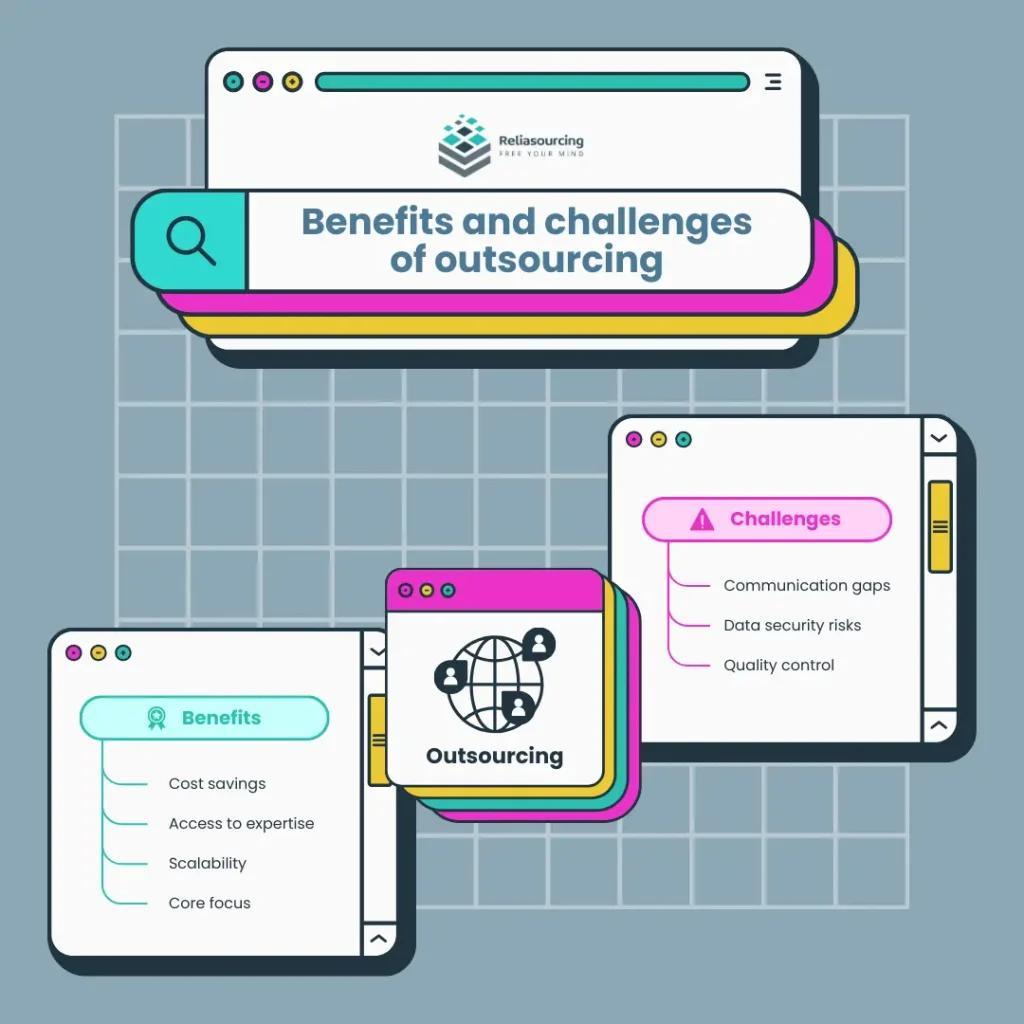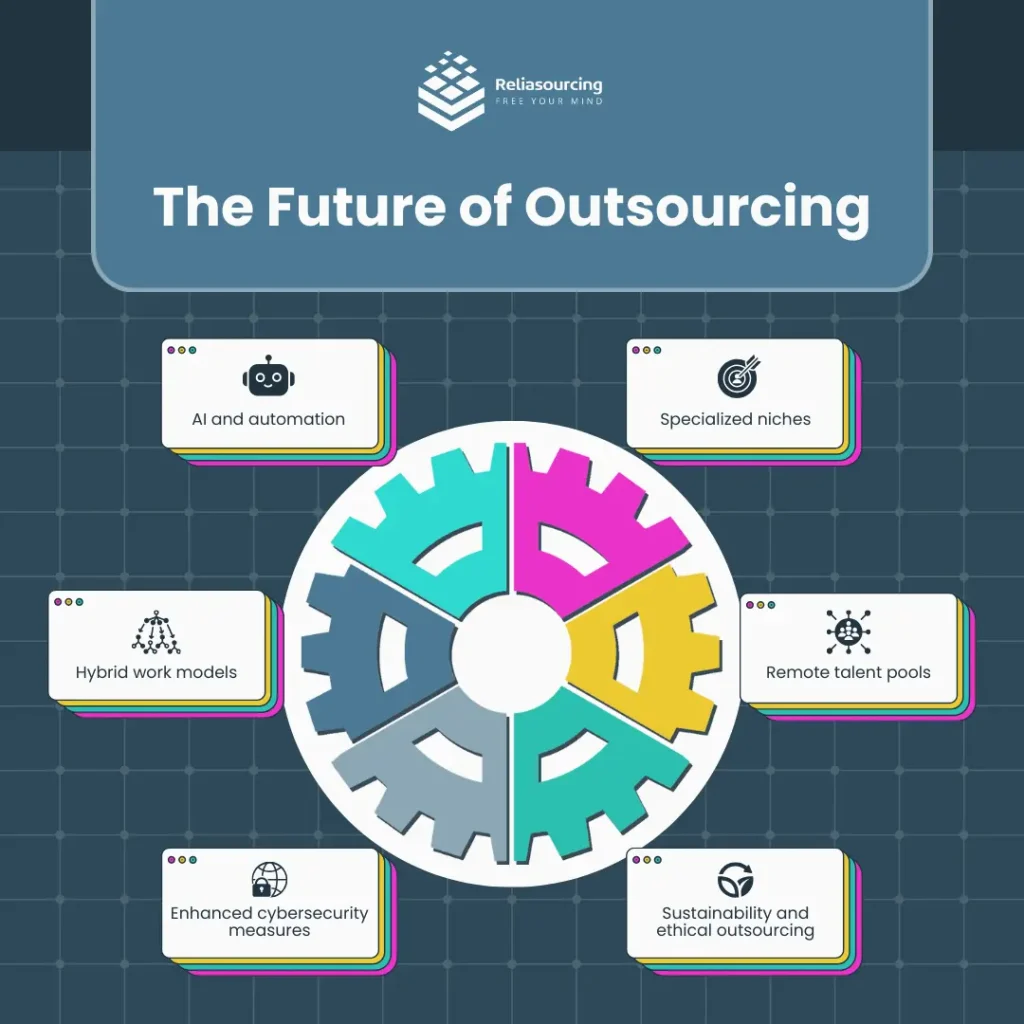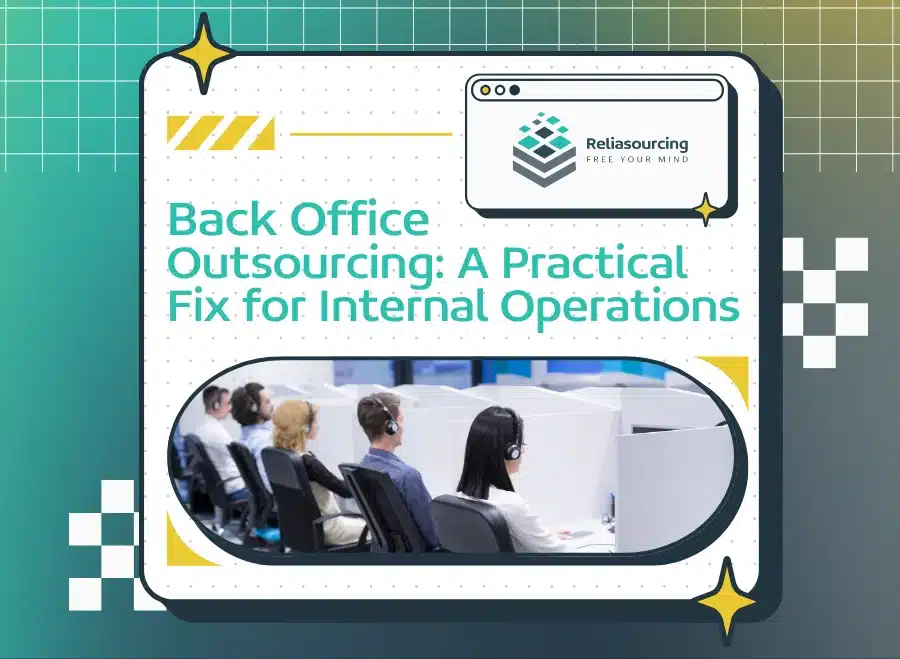It’s become clear: outsourcing is now a strategy for businesses to succeed. Be it related to cutting costs, accessing specialized expertise, or speeding up time-to-market, outsourcing offers numerous advantages. Think customer support in the E-Commerce sector or creative services for gaming companies, businesses are now evidently leveraging outsourcing to achieve their goals efficiently, and here are seven outsourcing examples and case studies that illustrate how companies, both large and small, have unlocked value by partnering with external experts, while also gaining valuable insights into the benefits, challenges, and trends shaping the future of outsourcing.
What is outsourcing?
Before diving into examples, it’s important to understand what outsourcing means in today’s context. In simple terms, outsourcing refers to the practice of delegating certain tasks, processes, or even entire business functions to external providers. These providers could be located locally or overseas, depending on the company’s needs and objectives. Modern outsourcing also isn’t just about cost-cutting, it’s a strategic move that allows businesses to:
- Gain access to skills and resources they might lack in-house.
- Focus on growth and innovation rather than operational bottlenecks.
- Stay flexible and adaptable in a rapidly changing market.
From start-ups to global corporations, businesses are rethinking how they approach outsourcing, making it a fundamental part of their business strategy. Let’s take a closer look at some of the best examples to see outsourcing in action.
7 top examples of outsourcing

Outsourcing comes in all shapes and sizes, tailored to meet the specific needs of a company. Here are seven standout examples that demonstrate its versatility and impact across industries.
1. Customer support outsourcing for E-Commerce giants
Customer support is one of the most outsourced functions, especially for E-Commerce businesses. Companies like Amazon are known for relying on external providers to manage their customer support operations globally, with said providers offering multilingual support and operating 24/7, ensuring customers get the help they need at any time of day.
For Amazon, outsourcing customer service means they can focus on scaling their business and innovating in areas like logistics and technology, and, at the same time, they leverage the expertise of trained customer service teams to handle everything from inquiries to complaint resolutions.
2. Creative services in social gaming
In the gaming industry, visual appeal plays a crucial role in attracting and retaining players, that’s why companies like Zynga often outsource creative services, such as animation and graphic design, to specialized agencies or freelancers, allowing gaming companies to focus on game mechanics and storytelling while ensuring the visual elements meet high industry standards. Outsourcing creative professionals results in a reduction of production timelines and costs, all without sacrificing quality.
3. IT outsourcing for SaaS startups
Software-as-a-Service (SaaS) companies are often under pressure to scale rapidly while maintaining tight budgets. Startups like Slack have turned to IT outsourcing to accelerate their development processes. Partnering with experienced software development teams in outsourcing hubs like Eastern Europe or the Philippines can empower SaaS companies to build robust platforms without the overhead costs of maintaining large in-house teams. In addition, the approach gives them access to cutting-edge technologies and skilled developers, enabling faster time-to-market.
4. Social media management for FinTech firms
In an era where digital presence defines brand success, FinTech companies like Payoneer outsource social media management to marketing agencies, and these agencies handle everything from crafting engaging posts to managing ad campaigns and monitoring analytics. For Payoneer, outsourcing social media management allows them to maintain a consistent and impactful online presence without diverting internal resources from their core operations, making it a win-win that allows them to stay ahead in a highly competitive market.
5. Data entry and processing for global banks
Global financial institutions such as Citibank handle massive amounts of data daily, and so to ensure accuracy and efficiency, many of them outsource data entry and processing tasks to specialized BPO providers who use trained personnel and advanced tools to process data quickly and accurately, not only reducing the risk of errors but also freeing up internal teams to focus on strategic decision-making.
6. Content moderation for online marketplaces
eBay and other similar online platforms rely heavily on user-generated content, which needs to be monitored for quality and compliance. In order to ensure efficient content management, these platforms outsource content moderation to teams with expertise in maintaining community guidelines and legal standards, all to ensure that these platforms maintain trust among users while avoiding potential legal issues. It’s an essential function that keeps marketplaces thriving.
7. Sales development services for SaaS scale-ups
Sales development is a critical function for SaaS companies looking to expand into new markets. Outsourcing this task to specialized providers allows these companies to focus on closing deals while outsourced teams handle lead generation, prospecting, and initial outreach. For SaaS businesses, this setup speeds up the sales cycle and improves overall efficiency, helping them grow faster and more sustainably.
Benefits and challenges of outsourcing

While outsourcing offers significant advantages in the many examples we’ve seen, it’s important to approach it with a clear understanding of its potential challenges.
Benefits
- Cost savings. Outsourcing often reduces labor and operational costs by leveraging more affordable markets like the Philippines.
- Access to expertise. It provides access to skilled professionals in areas that may not be part of your core business.
- Scalability. Outsourcing offers flexibility, allowing businesses to scale up or down depending on demand.
- Core focus. Outsourcing operational tasks grant internal teams the ability and time to focus on strategic initiatives and innovation.
Challenges
- Communication gaps. Working across different time zones and cultures can sometimes lead to misunderstandings.
- Data security risks. Handling sensitive information requires strict protocols and trust in the outsourcing provider.
- Quality control. Ensuring consistent quality can be challenging without regular monitoring and clear expectations.
Selecting the right outsourcing partner and establishing clear communication and performance metrics will drive businesses to overcome these challenges effectively.
5 case studies of successful outsourcing
Outsourcing isn’t just for startups or small businesses as it’s become a strategy embraced by some of the world’s most successful companies. From tech giants to e-commerce pioneers, these example businesses have turned to outsourcing to streamline operations, access global talent, and fuel growth, so come explore how renowned brands like Google, WhatsApp, Alibaba, Apple, and IBM harnessed outsourcing to achieve remarkable results.
Even a tech giant like Google embraces outsourcing to support its operations and scale efficiently. In 2016, Google partnered with Wipro, an outsourcing company based in India, to enhance its cloud computing services. Through this collaboration, Wipro provided technical support, cloud infrastructure management, and other services. Google accessed a wider talent pool and bolstered its cloud platform through Wipro’s expertise. Meanwhile, Wipro benefited from Google’s cutting-edge technology and expanded its client portfolio, and so the partnership highlights how outsourcing can drive innovation and mutual growth.
Another great example is WhatsApp, a global communication app with over 2 billion users, which owes much of its early success to outsourcing. Limited by resources, founders Jan Koum and Brian Acton outsourced app development to Russian developers. This was a strategic move that enabled WhatsApp to focus on core operations while keeping costs low. Outsourcing also facilitated the app’s cross-platform functionality, expanding its reach to iOS users. Moreover, the company’s efficient use of offshore development contributed to its rapid growth, culminating in a $19 billion acquisition by Facebook in 2014.
Alibaba
Alibaba’s journey to becoming an e-commerce powerhouse underscores the importance of identifying resource gaps and outsourcing strategically. In its early beginnings, founder Jack Ma faced a shortage of skilled web developers in China due to technical restrictions and limited expertise, and so he found outsourcing website design and development to specialists in the US to be effective in accelerating the growth of Alibaba. The company’s strategic outsourcing helped it achieve milestones like the largest Initial Public Offering (IPO) in history in 2014, raising $25 billion, a perfect example on how outsourcing can expedite company growth.
Apple Inc.
Apple revolutionized its manufacturing processes with the help of outsourcing to China in the early 2000s. Tapping into the region’s lower labor costs and high production quality empowered Apple to optimize its manufacturing efficiency all while maintaining premium product standards, ultimately helping Apple reduce costs and grow into a $2 trillion company, making it the world’s leading tech brand.
IBM
IBM turned to outsourcing in the 1990s to overcome industry challenges and regain its competitive edge. They found delegating non-core functions like IT, HR, and accounting to be their course of action so that IBM can focus on its core offerings, including cloud computing and AI. Outsourcing helped IBM improve efficiency, reduce costs, and reestablish itself as a leader in cutting-edge technology.
Future trends in outsourcing

Outsourcing continues to evolve, driven by technological advancements and shifting business priorities. As companies seek more efficient ways to operate in a competitive landscape, they’re exploring innovative approaches to outsourcing. Here’s how the future of outsourcing is shaping up:
1. AI and automation
The integration of artificial intelligence (AI) and automation is revolutionizing outsourcing by streamlining repetitive tasks, improving accuracy, and offering advanced data analytics. For example, AI-powered chatbots can handle a significant portion of customer service inquiries, reducing response times and improving customer satisfaction. Additionally, automation tools are being used in areas like data entry, payroll processing, and even predictive analytics, allowing businesses to make informed decisions faster.
2. Specialized niches
As industries become more complex, companies are seeking outsourcing providers with expertise in specialized areas. Creative services like video editing, animation, or UX/UI design are also increasingly outsourced to agencies or freelancers with niche skills. Similarly, businesses in sectors like SaaS and FinTech are partnering with outsourcing providers who understand the technical intricacies and regulatory requirements unique to their industries.
3. Hybrid work models
The rise of hybrid work models where companies combine in-house teams with outsourced talent is becoming a preferred strategy for achieving flexibility and scalability, allowing businesses to maintain control over critical functions while delegating operational or specialized tasks to external experts. Hybrid models are particularly effective for startups and growing businesses, enabling them to scale without the overhead of a fully expanded internal team.
4. Remote talent pools
With the growing acceptance of remote work, companies are no longer limited by geography when selecting outsourcing partners, allowing expanded access to global talent pools so businesses can tap into skilled professionals in regions like the Philippines, Eastern Europe, and Latin America. Remote setups like these also help companies maintain operations across multiple time zones, providing a near-24/7 capability.
5. Enhanced cybersecurity measures
As outsourcing expands into sensitive areas like IT and customer data management, the emphasis on cybersecurity has increased. Businesses are now prioritizing providers with robust security protocols, including data encryption, compliance with global standards like General Data Protection Regulation (GDPR), and advanced monitoring systems to prevent breaches.
6. Sustainability and ethical outsourcing
Sustainability is becoming a key factor in outsourcing decisions as businesses are actively looking for partners that align with their values, including ethical labor practices, environmental sustainability, and community impact, showing a shift that reflects a growing awareness among consumers and stakeholders who value socially responsible operations.
Reliasourcing has embraced these trends, ensuring its services remain relevant and future-proof. Integrating AI-driven tools, partnering with specialized experts, and offering flexible hybrid models, among other things, allows Reliasourcing to help its clients stay ahead in an ever-changing marketplace, all while placing a strong emphasis on data security and ethical practices, making it a trusted partner for businesses seeking innovative outsourcing solutions.
Frequently asked questions
Why do companies choose to outsource?
Companies choose to outsource to reduce costs, access the specialized skills of their partnered outsourcing company, enhance scalability to achieve business goals, and focus on core business areas.
What are the different types of outsourcing?
The different types of outsourcing include IT outsourcing for tasks like software development and tech support, BPO (Business Process Outsourcing) for processes such as customer service and payroll, KPO (Knowledge Process Outsourcing) to accomplish high-value tasks like market research and legal services, and RPO (Recruitment Process Outsourcing) for recruitment and hiring functions.
How does outsourcing differ from offshoring?
Outsourcing differs from offshoring in that it involves delegating tasks to third-party providers, while offshoring refers to relocating business processes to another country.
What factors should be considered before outsourcing?
Some of the factors to consider before outsourcing include the provider’s expertise to ensure they meet your needs, data security protocols to verify strong protection measures, cultural compatibility to align values for smoother collaboration, and overall cost-effectiveness to balance costs with long-term benefits.
Meet Reliasourcing – Industry-leading business process outsourcing solutions
Reliasourcing is a partner to achieve your success. Should you need support with your daily business functions or with scaling, we offer solutions tailored to meet your needs.
Our strengths include:
- Experienced professionals. A skilled workforce equipped to deliver top-notch services.
- Scalable solutions. Flexible plans that grow with your business.
- Future-ready strategies. Integration of AI and automation for maximum efficiency.
Ready to take the next step? Contact us today to explore how outsourcing with Reliasourcing can transform your business.
Final thoughts
Outsourcing offers countless opportunities to optimize operations and focus on what matters most—growing your business. The examples and case studies highlighted here prove that outsourcing can drive innovation, reduce costs, and improve efficiency. The key lies in selecting the right partner, fostering clear communication, and aligning objectives for mutual success.
So if you’re considering outsourcing, let Reliasourcing be your trusted partner with solutions to empower your business.









